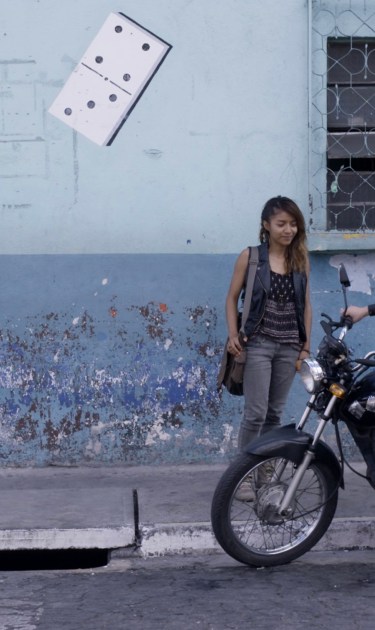In Pólvora en el corazón (Gunpowder Heart) impotence plagues the minds of two queer Guatemalan girls fed up with the unbearable state of helplessness of an economically impaired and morally decaying society. Misguidedly, a firearm infects the duo with a dangerous confidence to amend, by force, an unspeakable offense.
Derived from the writer-director’s personal accounts, Camila Urrutia’s debut feature echoes the tone and content of Aurora Guerrero’s Mosquita y Mari and Laura Mora Ortega’s Matar a Jesús (Killing Jesus), but still carves a singularly emotional dynamic from its specific national context and the conflicted motivations of the women it observes.
Pink-haired and androgynous Claudia (Andrea Henry) rides her motorcycle to see her best friend/love interest María (Vanessa Hernández), a more traditionally feminine though impulsive girl. The bike grants them an independence others their age, and, more notably, their gender, lack, as they traverse the city or flee peril. Labels are obsolete between them, though their feelings surpass the realm of the platonic.
In contrast to the men in both José and Temblores, two recent Guatemalan dramas centered on homosexuality in a conservative environment, the young duo’s sexual orientation doesn’t concern Urrutia as much as their vulnerable condition being women in a place where a “blame the victim” mentality rules and authorities perpetuate it. Family rejection and public homophobia never come into play, but widespread safety concerns do.
A rift between Claudia and María emerges when they’re victims of sexual violence one night. Claudia knows they’ve been wronged, but values more the possibility of a future together than whatever satisfaction can come from retribution. But María, in possession of her incarcerated father’s gun, is reluctant to let the crime go unpunished. Urrutia then harnesses their responses to expose the dysfunctional mechanics of their relationship.
Experienced in capturing the Guatemalan capital, cinematographer Paolo Giron, who coincidentally also lensed Li Cheng’s José in the same city, operates with more thrilling immediacy and open intimacy in his visual choices for Gunpowder Heart. In the male-centric counterpart, secrecy and guilt were the paramount force informing the images. Here, however, the camera is often in close proximity of the subjects’ decisions and mistakes, whether it’s for a sensual shower scene, a tense moment of confrontation or a thunderous final shot. Its social realist presentation is devoid of much vanity, even music appears only sporadically and not to accentuate obvious moments.
Like flowers grown in the cracks of an urban landscape, Claudia and María have survived amidst harshness and that stays true to form. As Claudia, Andrea Henry takes on the more substantial role. Through reciprocated to an extent, Claudia’s devotion to María outweighs her rationality at crucial times. She wants to protect her, go the United States together, but also doesn’t know where she stands. Jealousy surfaces when María enlists a guy with a criminal background to help with the avenging deed. Trapped in a complicated friend zone Claudia goes along with everything against her better judgment in a serious case of love blindness.
Henry makes that frustration visible through her expressive eyes filled with anger, anger directed at those who awakened such hate in María, at María for her inability to focus on anything beyond it, and at herself for participating. Unfortunately for the film, the incident and its aftermath consume the characters so intensely to the point where they are rendered nearly one-dimensional.
Within the first few minutes we learn María likes to create music and worked at a hair salon, while the production design helps us infer Claudia was raised in a left-wing household. These other facets of who they are or who they want to become fade into the background as soon as they are mentioned. Their plea for justice gives the plot a strong motor, but when pair is not actively putting themselves on the line or fighting about why they are doing so, we are left eager for more depth.
Urrutia prevents María and Claudia from fully engaging with what or who is around them. Their shared trauma gains dramatic power, but the story misses out on exploring the richness that she teased. These two women are surely more than this event but we don’t get to witness much of that. Still, when the adrenaline kicks into high gear maximizing our indignation for their ordeal, the director’s intention hits the target. Gunpowder Heart may fall short from igniting a full explosion, but it’s charged enough to leave a mark.
Gunpowder Heart is available from now until May 6, 2020 on Amazon Prime as part of the SXSW 2020 selections.




